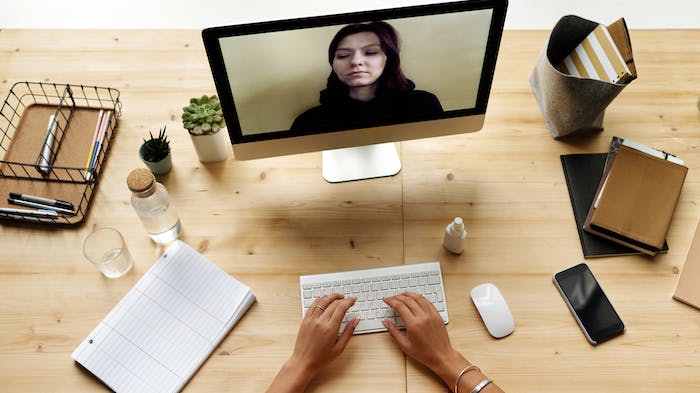Remote work has become one of the latest work trends since the COVID-19 pandemic.
It’s been seen as a blessing for many employees with personal obligations at home or who want a better healthy work-life balance and need flexible schedules.
Remote work has also promoted inclusivity and been able to support those who have disabilities.
However, despite many benefits to working remotely, there are also negative aspects – particularly with impacts on mental health. With a decline in mental health regularly associated with alcohol or drug use, or serious mental health issues, it’s important to keep on top of it for your mental well-being.
Let’s look at the psychological benefits of remote work, but also the challenges, and how we can encourage a healthy remote work lifestyle.

A significant benefit to employees and businesses is the increase in productivity thought to be achieved through remote work.
According to a study from Owl Labs and Global Workplace Analytics in 2022, 62% of employees said they feel more productive when working remotely. 52% of employees also said they would prefer to have a reduction in pay to be able to have the option of working remotely. [1]
Whether an increase in productivity is due to fewer commuting times or fewer workplace distractions, this positivity and job satisfaction in the workplace is bound to have an effect on the employees’ mental health.
Generally, when you feel productive, you also feel motivated and happy.
If employees feel good working, there is also an increased likelihood that they will stay at that company for longer as well.
Remote work also allows employees to reduce stress from an overwhelming work environment. Instead, they can feel comfortable and productive.

With this also comes challenges, however.
Remote work can lead to an increased sense of loneliness due to not having other work colleagues’ support and motivation.
It can also be difficult to separate personal and professional lives.
In an office, employees take breaks, but at home, you might find yourself having to take care of another responsibility or end up doing housework. This can end up taking its toll on your mental health and lead to burnout. [2]
Another issue can be focus. It can be incredibly difficult to maintain focus when you have disruptions at home. This can result in decreased productivity.

Whether you have been working remotely for a while, or are about to make the transition to remote work, there are plenty of ways you can help maintain your mental health. [3]
Here are our top tips for maintaining your mental health while working remotely.

Eating a healthy balanced diet and drinking lots of water can help to improve your mood, increase energy levels and encourage clearer thinking at work.
It’s proven that nutrition plays a significant role in our mental health.
When commuting to the office, preparing healthy meals is difficult. Working from home allows you to prepare healthy snacks in your own kitchen and stick to a meal routine.
So, make sure to stock your fridge full before the start of the week.
Sticking to a set schedule and daily routines is key to remote working, otherwise, work and personal time can often get blurred. To avoid stress, you need to make sure to balance your day and try to stay consistent.
Wake up at the same time every day, eat a healthy breakfast and get out of your pyjamas.
Try starting the day with a walk or time at the gym, before you start work so that you can get in your daily exercise straight away.
Perhaps most importantly, when you finish work, don’t be tempted to check emails. Log off and focus wholly on your personal life.
At the end of the day, try and stick to going to sleep at the same time. Adults generally need between seven to nine hours of sleep, so make sure you get this. [4]

It is important to manage any stress, depression or anxiety.
Try to take regular breaks away from your screen, and focus on something else before you return to work. This way you can concentrate more on your next task and be more productive.
You should also try to get outdoors as this has been proven to significantly increase your mental health.
Go for a walk, run or cycle to get some fresh air, or get a coffee with a friend for some endorphins. This can be factored into what would have been your daily commute. [5]
It’s a good idea to have a dedicated workspace away from distractions, such as the TV or other people in the house.
You should also try to always sit at a table and not be tempted to sit on the sofa. Sitting at a desk or table is the best way to encourage a productive mindset.

As working from home can increase feelings of loneliness and isolation, it is a good idea to stay connected and have plenty of social connections to help boost your wellbeing and mental health.
On your lunch break or a shorter coffee break, you could meet a friend. You could even have virtual coffee breaks with other remote employees and remote teams.
You could also join a co-working group or coffee shop space to allow you to have social interactions with other people who are working remotely. This can help you to feel a sense of community with other remote workers [6].
Even just using more video calls, instead of emails, can help to boost your morale.
It’s important to maintain a healthy mindset while remote working, as poor mental health can result in drug use or alcohol addiction.
For any advice and support with your remote work setup, or if you’re struggling with substance abuse as a result, get in touch with Rehab 4 Addiction today.
Call us at 0800 140 4690 for support with the signs of addiction, getting help at a residential rehab facility, or if you are finding recovery challenging. This can all affect your performance at work.
[1] https://owllabs.com/state-of-remote-work/2022
[3] https://www.ncbi.nlm.nih.gov/pmc/articles/PMC3052992/
[4] https://www.sleepfoundation.org/how-sleep-works/how-much-sleep-do-we-really-need
[5] https://www.mind.org.uk/workplace/mental-health-at-work/mental-health-and-working-remotely/
[6] Field marketing agency’s work on Mental Health Awareness